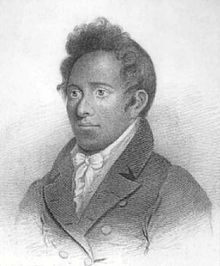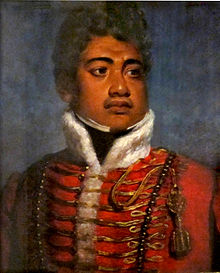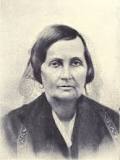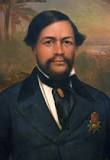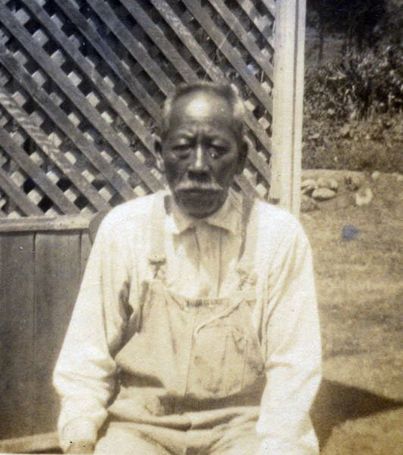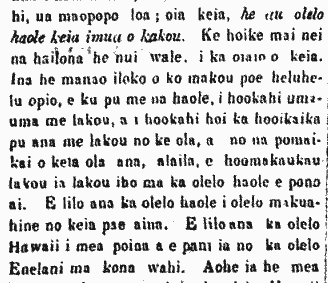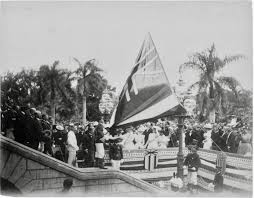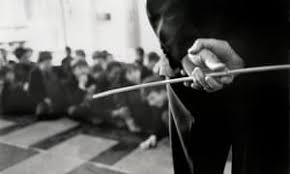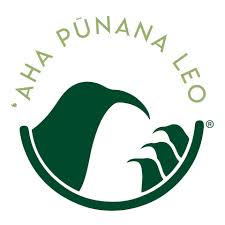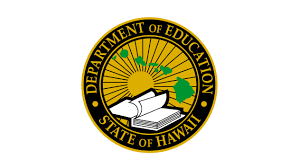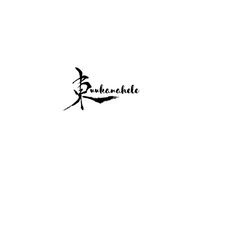1818 -
|
Henry ʻŌpūkahaʻia (1792-1818), after boarding the Triumph and sailing to Connecticut, was the first Native Hawaiian to convert to Christianity. By 1818, ʻŌpūkahaʻia "began to reduce the unwritten Hawaiian language to a written form ... [and] made considerable progress towards completing a Grammar, A Dictionary, and a Spelling-book [in Hawaiian]" (Lyons, 50).
It was ʻŌpūkahaʻia who inspired the missionaries to set sail for Hawaiʻi and land in 1820. |
1821 - 1823
|
In April/May, 1821, Kamehamaha II and his chiefs gathered in Honolulu and selected teachers to assist Mr. Bingham. Kahuhu, John Ti, Haʻalilio, Kauikeaouli, were among those who learned English.
In April, 1823, missionaries [began] adapting Hawaiian speech sounds to the English alphabet. As soon as the chiefs saw what a good thing it was to know how to read and write, each chief took teachers into his home to teach the chiefs of his household. Kaʻahumanu took Kaomimoe to her home, and when all her household had learned to read and write, she sent some of them to other islands to teach, and all the other chiefs sent teachers to their lands in other districts to teach the people to read and write. This was why education spread so rapidly (Kamakau, 248). |
1834 |
American Protestant missionaries produced the first newspaper at Lahaina, Maui. These newspapers recorded events & were active agents in shaping Hawaiian history and preserving Hawaiian language (Chapin, 1).
"By 1834, the literacy rate among Native Hawaiians was estimated to be between 91-95%. Laura Fish Judd, wife of missionary doctor Gerrit P. Judd, wrote, "The [literacy rate of the Hawaiian Kingdom] is estimated as greater than in any other country in the world ..." |
1874
|
In 1874, my Chinese great-great grandfather immigrated to Hawaiʻi and married my great-great grandmother in 1883. My grandmother was eight when he died and says he was fluent in two languages, Chinese and Hawaiian. He didnʻt bother to learn English because it wasnʻt necessary at the time. Since no one in the family but him spoke Chinese, my grandmother only ever heard him speak Hawaiian.
|
1879
|
Our Hawaiian ancestors were eager students, prompting the ʻōlelo noʻeau (proverb), ua ao Hawaiʻi ke ʻōlino nei mālamalama, Hawaiʻi is in an era of education. Unfortunately, history reveals that this era of Hawaiian language education did not last. On March 8, 1879, a Hawaiian language newspaper, Ka Nūpepa Kūʻokoʻa, printed the following:
... he au olelo haole keia imua o kakou. Ke hoike mai nei na hailona he nui wale i ka oiaio o keia ... E lilo ana ka olelo haole i olelo makuahine no keia pae aina. E lilo ana ka olelo Hawaii i mea poina a e pani ia no ka olelo Enelani ma kona wahi (... an English speaking era is ahead of us. There are numerous predictors attesting to this truth ... English will become a mother tongue for this archipelago. The Hawaiian language will become a forgotten language and English will substitute in its place). |
1896
|
"Act 57, Sec. 30 of the 1896 Laws of the Republic of Hawaiʻi mandated that English become the only medium of instruction throughout Hawaiʻi and prohibited the use of the Hawaiian language in schools" (Office of Hawaiian Affairs).
The prediction printed in 1879 was nearly realized. Children were punished, often corporeally, for speaking Hawaiian. |
1972
|
Ka Leo Hawaiʻi first aired on KCCN.
"Language is the first aspect of a people to vanish," said Kimura, who is now a faculty member at the University of Hawaii's College of Hawaiian Language on the Hilo campus. "People don't recognize that until it's almost gone, because they're hanging onto their typical culture identification tags such as their songs, their dancing, their foods, their religion maybe, or what they wear or how they look. But language is the one that is slipping away without them noticing it. And by the time it happens, it's in very dire straits" (Goo). |
1982
|
"The Hawaiian language wasn't heard much. For the most part, only the grandparents and people from the island of Niʻihau spoke it ... We realized our teaching wasn't enough. There weren't many students at the university who were becoming speakers. Only a few could go out and actually converse."
WHAT CAN WE DO TO REVIVE OUR LANGUAGE? "In January 1982, a group of Hawaiian language educators met to discuss strategies to perpetuate the language. From speaking with elders, they knew that raising children in an environment where Hawaiian was the ordinary language of interaction was central to survival of the language." ʻAha Pūnana Leo history/timeline |
|
2020 |
Starting in Spring 2020, In partnership with the Office of Hawaiian Education (OHE) along with the State of Hawaiʻi Department of Education (HIDOE), the University of Hawaiʻi Community Colleges (UHCC) offers limited subsidized, introductory Hawaiian language college credit courses at no-cost to HIDOE employees.
|
STATS
According to a 2016 state government report, 18,000 people living in the state say they speak Hawaiian as well as English at home — a huge increase since the 1980s when only a handful of speakers remained — but efforts need to be continued until speaking Hawaiian language in our community is as common as speaking English.
- In 1896, it became illegal to speak/teach Hawaiian language in schools. Today there are 25 Hawaiian language immersion schools throughout the islands that serve 2,000 K-12 students, not including K-12 public and private schools teaching Hawaiian language as an elective. Students can continue their Hawaiian language education in college and earn a bachelor's, master's and Ph.D at the University of Hawaiʻi.
According to a 2016 state government report, 18,000 people living in the state say they speak Hawaiian as well as English at home — a huge increase since the 1980s when only a handful of speakers remained — but efforts need to be continued until speaking Hawaiian language in our community is as common as speaking English.
- ʻAha Pūnana Leo. "Our History."
- Chapin, Helen Geracimos. Shaping History: The Role of Newspapers in Hawaiʻi. Honolulu, HI: University of Hawaiʻi Press, 1996.
- Goo, Sara Kehaulani. "The Hawaiian Language Nearly Died. A Radio Show Sparked Its Revival." June 22, 2019.
- Kamakau, Samuel M. Ruling Chiefs of Hawaiʻi." Honolulu, HI: Kamehameha Schools Press, 1992.
- Ka Nupepa Kuokoa, 8 March 1879.
- Lyons, Jeffrey K. "Memoirs of Henry Obookiah: A Rhetorical History." The Hawaiian Journal of History, vol. 38. HI: Hawaiian Historical Society, 2004.
- Office of Hawaiian Affairs. "A Native Hawaiian Focus on the Hawaiʻi Public School System, SY2015." April 2017.
